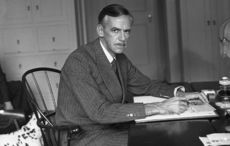Over 60 years since she passed away, Colette is still France's most widely read female writer, and as the new film starring Keira Knightley, Fiona Shaw and Denise Gough makes clear, she's also a feminist icon who has plenty to say to our own times.
Born into a man's world in 1873, Sidonie-Gabrielle Colette (or Colette, as she was known) became a novelist by accident.
In the new biographical film (opening Friday 21) about her life and times, Keira Knightly brings the spirited French novelists story to life in a barnstorming performance that is clearly tilting at an Oscar.
She's so good you lose sight of your initial impression that she's glaringly miscast (what is the most English of roses doing playing the most French of all women writers?)
Read more: Tale of Turkish Sultan’s help during Irish Famine to become a movie

Kiera Knightley and Elanor Tomlinson in Colette
Knightley starts off in schoolgirl pigtails, playing the smart but unsophisticated young woman from the country, Saint-Sauveur-en-Puisaye in the picturesque winemaking region of Burgundy, to be precise.
Born to a war-hero father named Jules-Joseph Colette and his wife Adele Eugenie Sidonie (played by Fiona Shaw), the once prosperous family can't afford to offer the kind of dowry that would see their daughter quickly married off to any eligible well-to-do bachelor.
But as Colette shows us, the spirited young woman in this story doesn't care. She's already been conducting a clandestine love affair with Henry Gauthier Villars (one of the most notorious womanizers in Paris) and she's already determined to follow her own heart in life and love, regardless of where it leads her.
Read more: "Float Like A Butterfly" Irish Traveller girl boxing movie wins big at TIFF

Kiera Knightley in Colette
It soon becomes clear that she has married a man who is utterly incapable of remaining faithful to her, but she never doubts his love for her once (Dominic West is superb as her errant spouse). In this way, her increasingly unconventional marriage soon makes room for more than one lover of her own.
But with the bailiffs banging at the door demanding rent, her cash-strapped publisher husband suggests she write a novel to keep them both financially afloat.
What happens next stuns everyone, the young author most of all. Her debut book becomes a literary sensation that flies off the shelves, and the talented pair soon became the toast of Paris but with one significant catch. People believe Colette's husband has written the bestselling book because his name appears on the title page as the author.
No one will read books written by women, Colette's husband has convinced his impressionable young wife and she believes him, even after it had become quite clear she is the sole breadwinner in their gorgeous new home.
Colette's debut novel is only the beginning. Soon her fictitious alter ego Claudine (the book's obvious stand-in for herself) inspires a play, a fashion craze, a new hairdressing trend, a soap, a perfume, even a hot drink. She hits the big time, in other words, the kind of success and fame that's enjoyed by writers like J.K. Rowling in our own time.
But Colette is no flash in the pan and her books are not fairy tales for kids of all ages. Instead, she writes groundbreaking stories that put young women at their center and that lets them speak in their own voices, giving their stories center stage.
The author isn't just revolutionizing publishing in other words, she was changing France. She was letting the nation see the real lived experience of a typical young French woman and she was pulling no punches, it was a trailblazing act for the time.
Fiona Shaw is a sensation as Colette's mother, first appearing in silhouette like a painting by Van Gogh. She telegraphs where Colette has found her steely resolve and she carries herself with the self-possession of an austere 19th-century matriarch, a role in which she admits she sometimes feels miscast.
Shaw has been quietly amassing roles in a series of critically acclaimed dramas lately from "Lizzie" (the story of the famous ax murderer) to the hit TV show "Killing Eve." In Colette she does terrific work showing us both how close and how far the apple has fallen from the tree in terms of her gifted daughter.
What makes Colette the author and the woman (and indeed the film) stand out is the radical honesty she requires of herself, her husband and her growing list of lovers. When Henry thinks she might be looking elsewhere he becomes jealous, until he discovers she's looking at women, not men. Colette laughs at this double standard and the film has a lot to say about the way men rationalize their personal prejudices.
Is an open marriage a real marriage, the film asks? Is happiness a real thing and can you strive for it yourself without hurting others? Is sex a thing to share with many or one? Is sexuality fixed or can it be various? These are all absorbing questions and it's rare to see a big-budget mainstream film of this kind actually tackle them.

Denise Gough and Kiera Knightley in Colette
Into Colette's life at a critical juncture comes Mathilde de Morny (played by Denise Gough) a French noblewoman and, the film makes clear, a transgender man before the term even existed. Known as Missy to his friends, he dresses and presents as a man at all times and he fascinates the wide-eyed Colette, who is amazed to discover that such a person can even exist.
Gough makes a persuasive case for a Best Supporting Actor Oscar in the role of friend, confidant and eventual lover, taking the time to ask Colette what will happen when she is no longer content to let her husband masquerade as the author of her books?
The role of an early 20th-century transgender man is one that Gough nails from the first scene, reminding us that throughout history trans people have always been there. When Colette and Missy take to the stage at the Moulin Rouge in 1907 their performance concludes with a kiss that leads to a riot.
Outraged men throw glasses and stools at the stage and the pair is forced to live apart and conduct their affair in secret from then on.
Meanwhile, the tension between Knightly and West is as strong as their chemistry, and you want them to stay together even as you admit to yourself it's becoming impossible due to her husband's selfishness and short-sightedness. West's Henry is pompous, sometimes pretentious, often self-aggrandizing, but there is never any doubt that he adores his talented wife and best friend.
"Colette" does something that films of its budget rarely do, it asks hard questions about love and about the battles between the sexes and it doesn't dodge the hard answers these questions sometimes lead to. Knightley has picked a role that may end up defining her career and she gives it everything she's got, in a production that is as rich and engrossing as the belle epoch in which it is set.
You can't put a price on the truth and you really can't live until you live truthfully, the film reminds us. What made Colette important to her own time makes her important to ours, like Oscar Wilde she understands that the most radical thing she could ever do was simply be herself. In "Colette," we see the reward for that discovery.




Comments